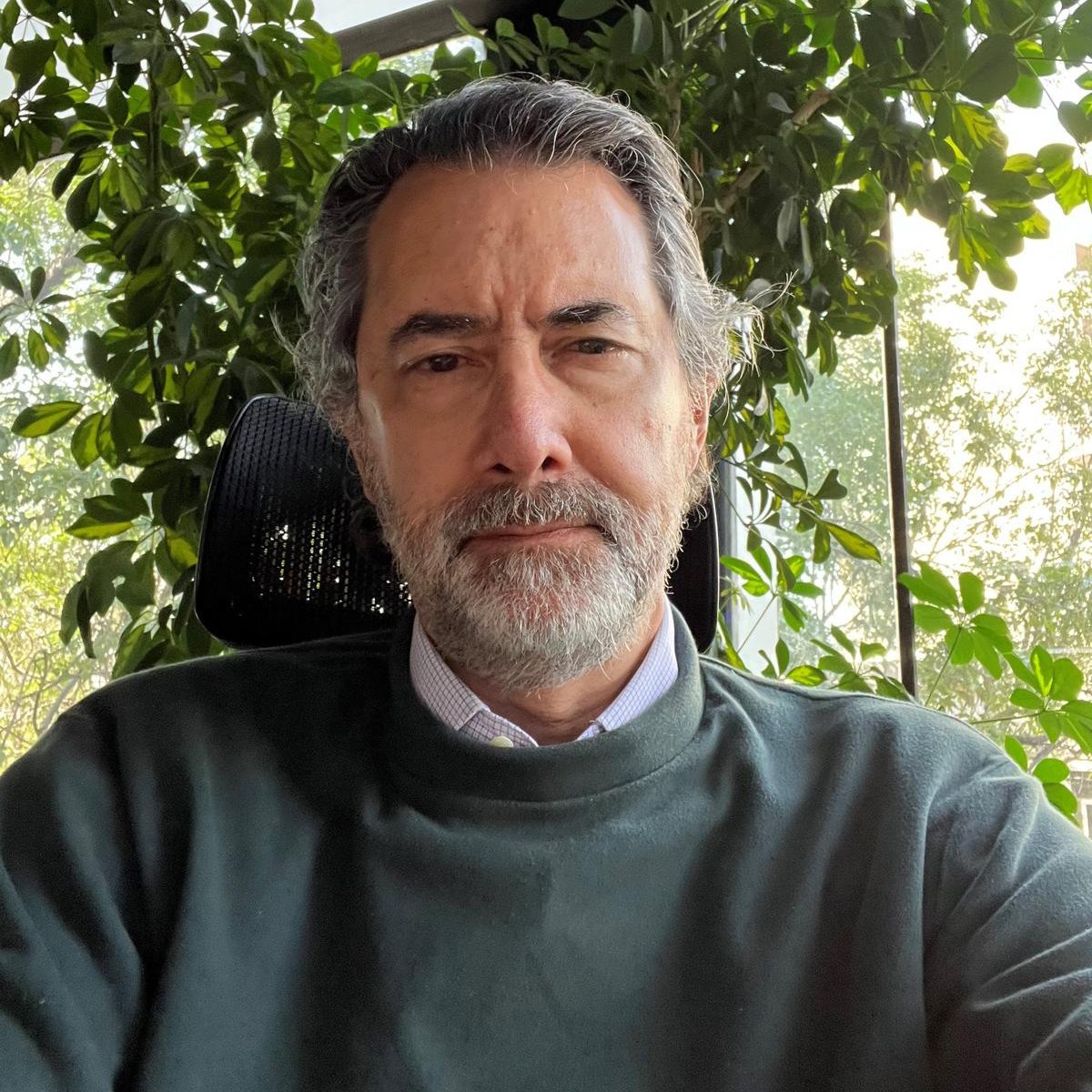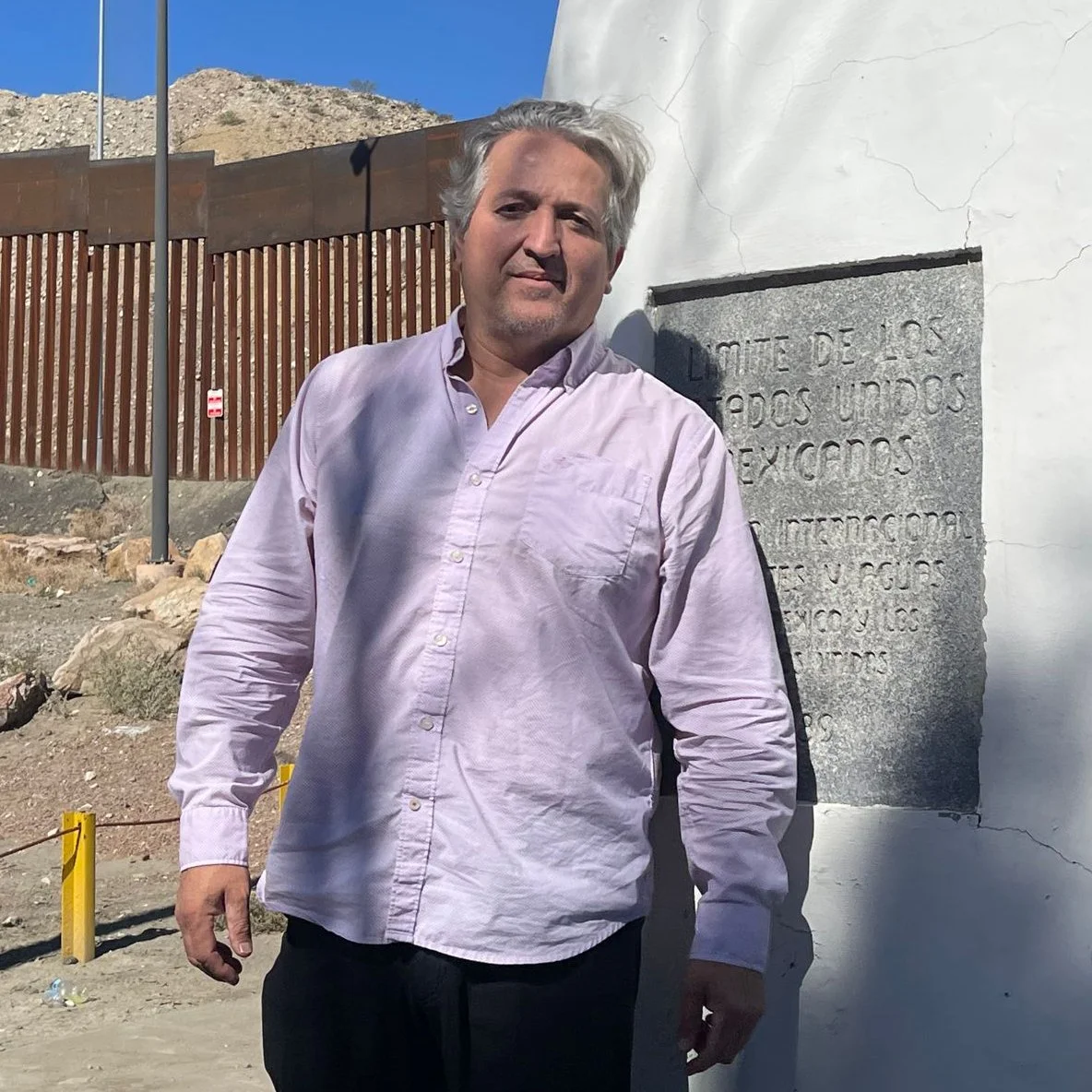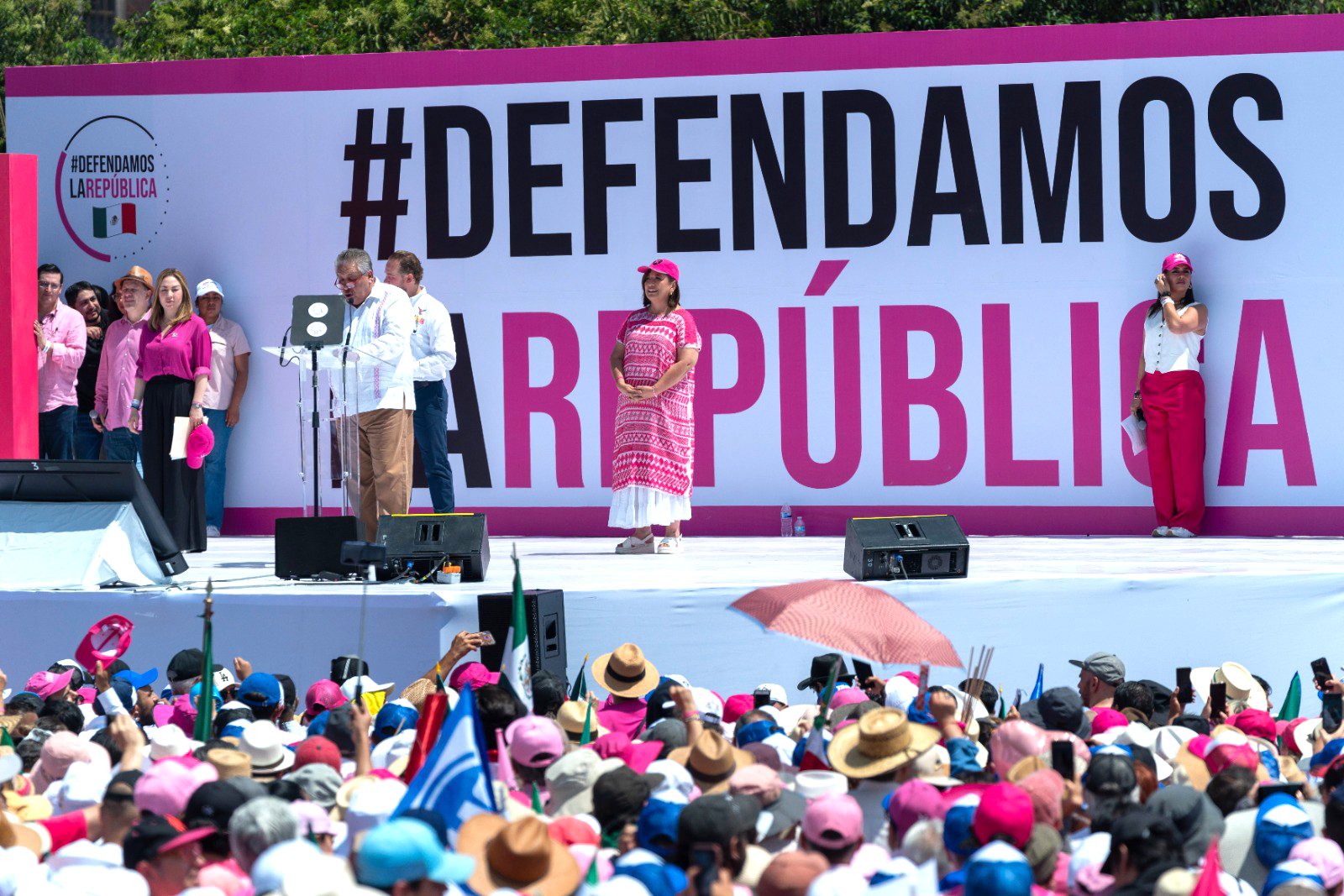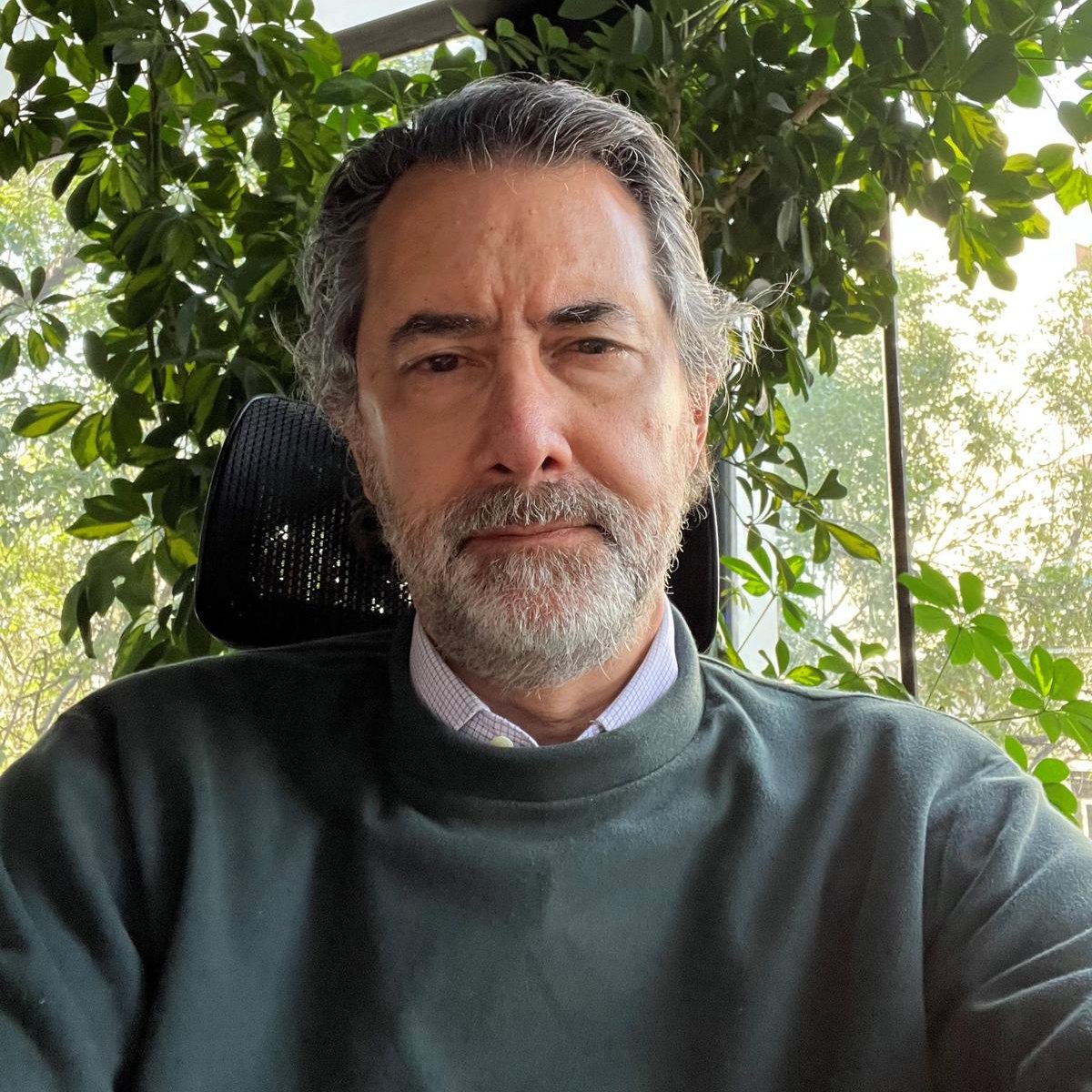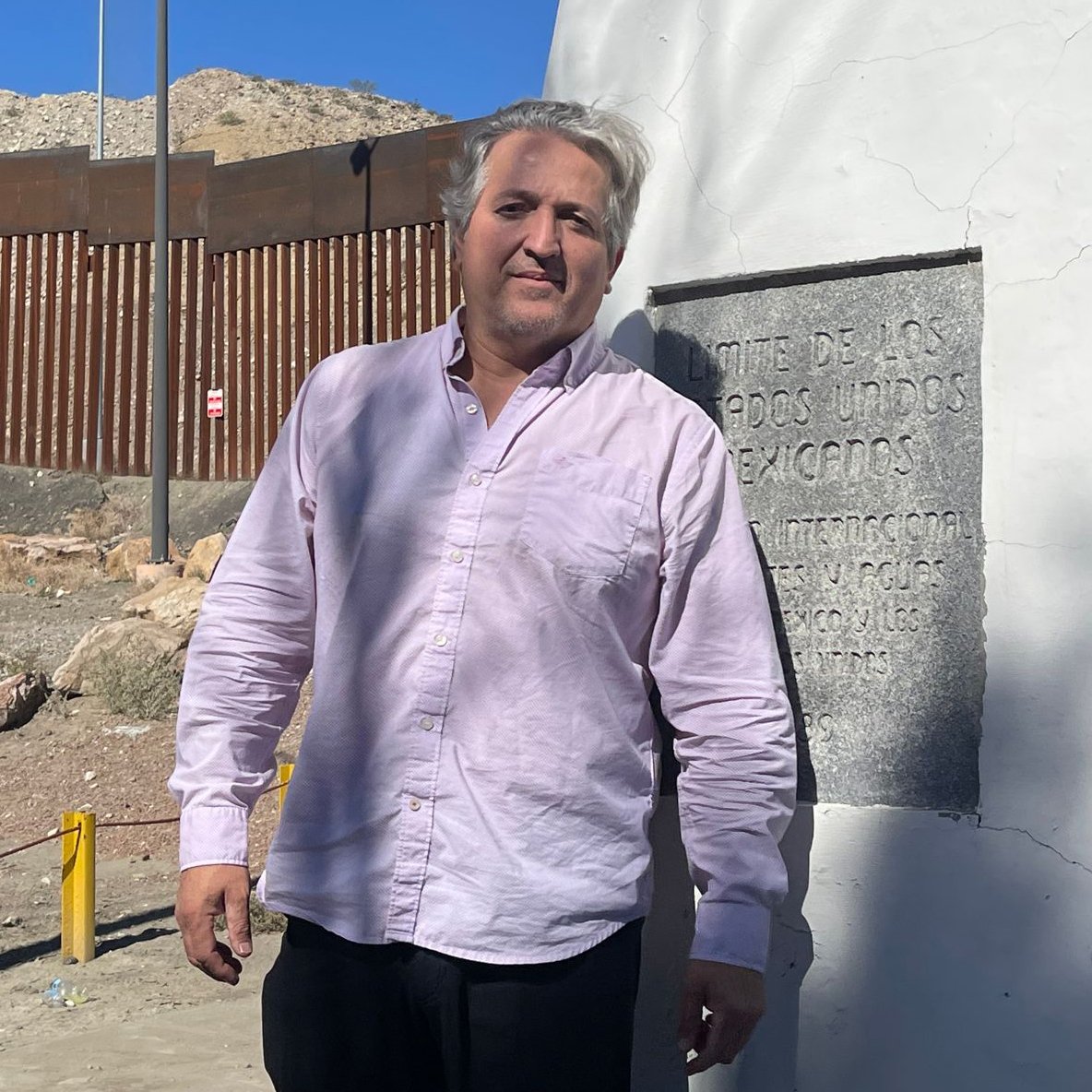In Mexico’s Historic Vote, Politics are Little Changed
Leading presidential candidate Claudia Sheinbaum ended campaigning at the zócalo, Mexico’s main public square in Mexico City on May 29, 2024, ahead of the June 2 presidential election. Sheinbaum could become the first woman to lead Mexico. Photo by Omar Ornelas/El Paso Times
The upcoming Mexican presidential election may determine the fate of Mexico’s 30-year-quest for a full democracy
Editor’s note: This story was co-published with Puente News Collaborative. Puente News Collaborative is a bilingual nonprofit newsroom, convener and funder dedicated to high quality, fact-based news and information from the U.S.-Mexico border. Angela Kocherga, news director at KTEP public radio, contributed to the story.
Haga clic aquí para leer el reportaje en español.
MEXICO CITY — Crossing a historic threshold, Mexicans appear poised to elect a woman as president this Sunday but to otherwise leave politics largely unchanged.
Indeed, the vote won’t reflect hunger for a sweeping shift in the country’s direction that took place six years ago when high levels of corruption from state and federal authorities led voters to elect a new alternative, represented by Andrés Manuel López Obrador and his four-year-old political party Morena, according to a nationwide in-home poll commissioned by Puente News Collaborative, an El Paso-based non-profit organization.
In what will prove the largest election in Mexican history, nearly 100 million people — including millions living in the United States and elsewhere — are eligible to cast a ballot. In play are more than 20,000 local, state and congressional posts.
Supporters of Morena presidential candidate Claudia Sheinbaum attend the last rally of her presidential campaign at the zócalo on May 29, days ahead of the election on Sunday. Photo by Omar Ornelas/El Paso Times
Claudia Sheinbaum, 61, is a physicist, environmental engineer and former Mexico City mayor who is ethnically Jewish in an overwhelmingly Roman Catholic society. Her likely election comes amid a deepening gangland grip on the country and widespread fears among political analysts and voters of a return to the autocratic rule that governed Mexico until the turn of this century.
In addition to political preferences, Puente’s survey gauges Mexicans’ attitudes toward their solid export-fueled economy, the often fraught ties with the United States and the millions of foreigners who have taken up at least temporary residence here, the most ever.
‘What we're seeing is that the Mexican people are behaving as if they had no power to demand and to expect a better government.’
While concerned by the migrant influx, more than two-thirds of poll respondents said the migrants should be given temporary work permits even as the government tightens control of the borders and the human flow.
Yet, if the Puente poll and an array of others prove accurate, most Mexican voters will opt for the status quo.
“There seems to be a certain complacency, social resignation — a certain lack of (the) urgency that a few years ago really ignited Mexicans,” said Carlos Bravo, a Mexican political analyst and frequent critic of the governing party. “What we're seeing is that the Mexican people are behaving as if they had no power to demand and to expect a better government.”
The Puente poll — conducted by Mexico City’s Buendia & Marquez firm and funded in part by the Center for the U.S. and Mexico at Rice University’s Baker Institute and UC-San Diego’s Center for U.S. Mexican Studies — represents a rare survey of the Mexican public by U.S. media. The poll interviewed 1,000 demographically diverse people and was slightly skewed to areas nearer the U.S. border. It has a margin of error of +/-3.5%.
The survey gives Sheinbaum as much as 54% of the vote, after eliminating undecided or voters who declined to answer the survey. Center-right candidate Xóchitl Gálvez garners 34% while 12% of respondents favor center-left candidate Jorge Álvarez Máynez from Movimiento Ciudadano. That portion of the survey was the Mexico daily, El Universal.
WITH AN EYE ON THE NORTH
Mexico’s national election this year — as it does every dozen — coincides with the U.S. presidential vote.
Overall, Mexicans have a favorable view of the United States, particularly the Americans who are increasingly moving to Mexico either to retire or work remotely. Those recent arrivals so far are undeterred by a 23% strengthening of the peso against the U.S. dollar in the past five and half years.
‘What I’m really worried about is Trump coming back to office. I’m scared he’ll shut down the international bridges and that will kill us financially.’
Most respondents in the Puente poll judge Sheinbaum most capable of dealing with the U.S. relationship. The poll suggests that 69% of Mexicans believe Joe Biden would prove better for Mexico, compared with just 11% saying that about Donald Trump.
“Elections in Mexico don’t worry me much, because nothing really changes,” said Miguel Vargas, 68, a taxi driver in Ciudad Juarez, which borders El Paso. “What I’m really worried about is Trump coming back to office. I’m scared he’ll shut down the international bridges and that will kill us financially.”
Mexico last year overtook China as the largest U.S. trading partner. Nearly $800 billion worth of products were traded in 2023, the largest sum between two nations anywhere, according to U.S. trade figures.
Texas, California and Arizona take the lion’s share of that business. But binational trade is deepening into the U.S. industrial heartland — particularly in Illinois, Michigan and Wisconsin.
Other key Puente poll takeaways:— Most Mexicans (68%) oppose building border walls to stop migrants, preferring the implementation of work permits instead. — Seventy percent of Mexicans believe the most important action the U.S. can take to help combat criminal organizations is to stop the flow of weapons. — More than a third of Mexicans say they would migrate to the U.S. to improve their living standards. |
BUSINESS AS USUAL?
Legally limited to a single term, President Andrés Manuel López Obrador, 70, has strongly backed Sheinbaum, his hand-picked candidate. She, in turn, vows to deepen his nationalist-populist agenda — the so-called Fourth Transformation, or 4T, that has created different cash-transfer programs for the poor, mainly for the elderly, students, farmers and kids with disabilities. That agenda seeks to replace many market-friendly policies of past presidents, like the opening of the energy sector to private capital.
Xóchitl Gálvez, also 61, a conservative businesswoman and former federal senator, leads a triple alliance of centrist political parties that dominated politics until López Obrador’s 2018 election.
Mexico presidential candidate Xóchitl Gálvez for Fuerza y Corazón por México coalition parties speaks at a rally in Ciudad Juarez on April 13, 2024. Photo by Rafael Medina/ Special to the El Paso Times
Gálvez’s candidacy perhaps has stolen the import of Sheinbaum’s gender-breaking moment. But Mexican women have greatly increased their political participation. Reforms a decade ago mandate that women comprise half of candidates vying for local, state and federal office.
For many voters, this election stands as a referendum on López Obrador. His Morena party, which he founded barely a decade ago, now holds the majority of Mexico’s national Congress, two thirds of its 32 governorships and a significant portion of Mexico’s nearly 2,500 municipalities.
Candidate Claudia Sheinbaum at the capital's main public square addressing her supporters during the mandated end of her campaign. According to the Puente survey, Sheinbaum leads with up to 54% of the Mexican vote. Photo by Omar Ornelas/El Paso Times
Many critics fear the president — widely known by his initials, AMLO — intends to rule from behind the scenes. In interviews with Puente, analysts and voters said the election may decide whether the country persists in its stumbling search for full democracy that began 30 years ago.
“It’s not so much about two women, but about a stubborn old man,” said Gerardo Contreras, 58, a Mexico City barber. “People forget how far we have come only for our leaders, particularly López Obrador, to send us backwards.”
Neither of the leading candidates’ ethnicity has played much of a role in the campaign. Sheinbaum, whose ancestors fled the Holocaust, has said she was raised in a secular left-leaning household. Gálvez grew up poor as the daughter of an indigenous Otomí father and mixed race mother and worked her way through university.
Candidate Xóchitl Gálvez and gubernatorial candidate Santiago Taboada speak to supporters at the zócalo during a "Marea Rosa" march on May 19, 2024. Photo by Stephanie Corpi in Mexico City/Special to the El Paso Times
Claudia Sheinbaum supporters hold sings and banners at the zócalo. A decade-old reform mandating women to make up half of candidates for local, state, and federal office has led to a significant increase in political participation among Mexican women. Photo by Omar Ornelas/El Paso Times
But Gálvez’s three-legged coalition includes once-prominent and now widely discredited political parties. The Institutional Revolutionary Party (PRI) held the presidency for most of the past century but its return to the presidency in 2012 proved disastrous.
Gálvez’s center-right National Action Party, which ended the PRI’s political grip in the 2000 elections, largely underwhelmed Mexico in the 12 years it held the presidency. Weakest of the three, the Democratic Revolution Party, was the country’s main leftist movement until López Obrador siphoned away its supporters.
VOTING UNDER THE GUN
Voters interviewed by Puente say insecurity remains a primary concern. But they see no immediate end or viable solution to it. Violence simply has become part of daily life for the country’s 130 million people.
Once fueled by narcotics trafficked to U.S. users, criminal violence has risen sharply in the two decades since presidents from Galvez’s PAN party launched a military-led campaign against the criminal organizations and that president Felipe Calderón called the “war on drug cartels.”
Hundreds of thousands have been murdered and many thousands more disappeared and presumed dead. Extortion, fuel theft, human smuggling and other rackets have replaced narcotics as sources of gangster income.
Mexican voters flood the streets near the zócalo in support of Morena’s candidate Claudia Sheinbaum. Photo by Omar Ornelas/El Paso Times
Although he’s kept the military in the fight, murders have averaged about 30,000 a year under López Obrador, making his the bloodiest administration this century. Despite that, the president enjoys a 70% approval rating, according to Puente’s poll, suggesting he’s largely escaping blame for the violence.
López Obrador leaves office October 1.
The gangsters' sway in politics, especially at the local and state levels, is reflected in the assassinations that have stained this year’s campaigns. Some three dozen candidates from all parties have been killed. Scores more have dropped out of their races out of fear.
“Violence has become a normal thing for us,” said Alejandra Ornelas, 28, a factory worker in Mexicali interviewed by phone. “These days you just never know where you may find bodies on the way to work. Maybe on the road, or next to a canal. There needs to be punishment.”
Still, Ornelas said, Sheinbaum was getting her vote.
“Because of the money Morena gives to help us,” Ornelas explains, nodding to the cash handouts and other subsidies to Mexico’s neediest, a bulwark of López Obrador’s policies.
A supporter of Claudia Sheinbaum attends a rally by the candidate at the zócalo. Photo by Omar Ornelas/El Paso Times
Elsewhere along the Mexican side of the U.S. border, some poll respondents went silent when the conversation turned to the criminal threat.
“Answering that question can get us killed,” explained a voter in Reynosa, an industrial city across the Rio Grande from the South Texas city of McAllen.
Alfredo Corchado is the executive editor for Puente News Collaborative and the former Mexico/Border Correspondent for The Dallas Morning News. He’s the author of “Midnight in Mexico” and “Homelands.” @ajcorchado
Other palabra articles by Alfredo Corchado: Words To Live By
Eduardo García established Bloomberg’s Mexico bureau in 1992 and served as its leader until 2001, overseeing the agency’s award-winning coverage in the country. In 2001, he embarked on a new venture by founding his own news organization, Sentido Común. For nearly 18 years, he guided Sentido Común to become one of Mexico's most esteemed financial websites. Later, he merged his company with the local financial news agency Infosel, assuming roles as editor-in-chief and subsequently Chief Content Officer.
Omar Ornelas is a Mexican photojournalist based in Ciudad Juárez, Mexico. For the last 20 years, he has been reporting on and photographing farmworker labor, education, health and housing issues in California, Texas and Arizona, as well as border security and Mexican and Central American migratory flows at the U.S.-Mexico border, for the USA TODAY Network. @fotornelas
Angela Kocherga, an award-winning journalist and news director of the public radio in El Paso, and NPR contributor for regional and national stories about the border. She’s also a co-host for the Texas Standard statewide daily news program. @AngelaKBorder
Other palabra articles by Angela Kocherga: El Paso Remembered
Dudley Althaus has reported on Mexico, Latin America and beyond for more than three decades as a staff newspaper correspondent. Beginning his career at a small newspaper on the Texas-Mexico border, Althaus had an award-winning 22-year stint as Mexico City bureau chief of the Houston Chronicle. After a four-year run as a Mexico correspondent for The Wall Street Journal, Althaus covered immigration and border issues as a freelancer based in San Antonio for Hearst Newspapers. He has covered every Mexican presidential election since 1988, when Mexico's troubled transition to democracy began. @dqalthaus




